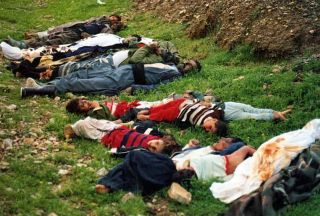Iran urges intl. efforts against WMD, CW

A senior Iranian commander has called for collective global efforts against the proliferation of weapons of mass destruction (WMD) and chemical weapons (CW).
Brigadier General Seyyed Masoud Jazayeri, the deputy head of Iran’s Armed Forces Joint Chiefs of Staff, said that chemical bombardment of the northwestern Iranian city of Sardasht by the former Iraqi regime was “a clear violation of international law and a document that caused a scandal for Western supporters of [executed Iraqi dictator] Saddam Hussein.”
On 28th of June 1987, during the 1980-88 Iraqi-imposed war on Iran, Sardasht, near the border with Iraq was the target of four bombs containing 250 kilograms (550 lb) of mustard gas. The bombs were dropped in the densely populated town center.
Sardasht is the first town in the world to be gassed. Out of a population of 20,000, some 5,000 people are still suffering severe illnesses as a result of the chemical attack.
Jazayeri went on to say that “the silence of Western countries” and international organizations which claimed to defend human rights “gave a green light to the Iraqi regime to continue using the weapons until the end of the war.”
“International human rights organizations turned a blind eye to the disaster and gave an opportunity to Saddam to continue its crimes against humanity by creating the Halabcha disaster in Iraq’s Kurdistan,” he said.
On March 16, 1988, during the closing days of the eight-year Iraqi imposed-war on Iran, Iraqi forces launched a chemical attack on Halabcha in Iraqi Kurdistan that left thousands of people dead.
The attack is considered to be the largest direct chemical attack against a civilian-populated target in history. It is believed that Saddam’s forces used a variety of chemical agents including mustard gas and nerve agents Sarin and Tabun.
Images and videos of the massacre were first taken by Iranian journalists who passed on the footage to other media outlets. The international response at the time, however, remained muted.







